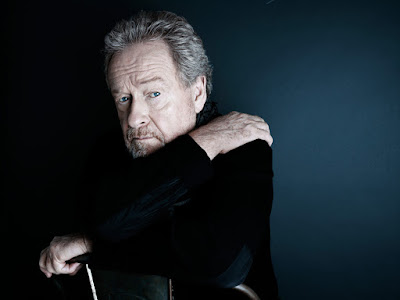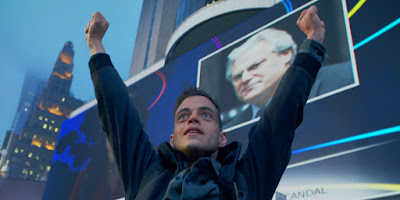Silver Screen Spotlight: Ridley Scott
Known for his grand and atmospheric visual style, which blends highly concentrated imagery with epic scale, director Ridley Scott has defined his career by never being afraid to go bigger. Diving into everything from the street-level drug wars of Harlem in 2007's American Gangster to the far reaches of bone-chilling space in 1979's Alien, Scott continues to leap into more and more grandiose projects that represent his unique eye for epic filmmaking. With his highly-anticipated follow-up to 2012's Alien prequel Prometheus releasing this month, I set my sights on the ever-swaying pendulum of Scott's profound, and rather pricey, filmography.
Right at the start of his career in film, one could determine two obvious things about director Ridley Scott. For one, when the man has a vision, he sticks to it, and delivers all that he can wring out of said vision. Second, he's never afraid to go bigger, and take a few risks along the way. Those traits are clearly evident in the first handful of films Scott brought to the screen beginning with 1977's The Duellists. Bringing the Napoleonic Wars to the silver screen, based on a short story by Joseph Conrad, Scott's film debut soon promised the director an illustrious career as a master of not only visual effects, but also crafting iconic performances from his characters.
His next two films, the deep-space horror of 1979's Alien and 1982's neo-noir classic Blade Runner, gave audiences just that, as Scott produced two of his best films to date. Each with their own realm of breathtaking visual effects and production design, from the chilling interior of the Nostromo in Alien to the futuristic cityscape of 2019 Los Angeles in Blade Runner, the two films would soon become two of the most iconic science-fiction films ever made. Renowned today for their complex themes and iconic leads in Blade Runner's Rick Deckard (Harrison Ford) and Alien's Ellen Ripley (Sigourney Weaver), the two films would remain Scott's most noteworthy projects as he moved into other genres of film.
After directing the iconic Apple commercial, "1984", marking the release of the Macintosh computer, Scott went on to direct a number of ambitious projects. From the fantasy epic, Legend, to the 1991 female-driven road movie, Thelma & Louise, Scott experienced a frustrating rollercoaster of receptions as his box-office performance swayed with every new film. While the early Tom Cruise vehicle Legend and the independently-funded historical epic 1492: Conquest of Paradise might not have fared well in the theaters, nothing seemed to slow down Scott for very long as the early 2000s gave rise to some of the director's most esteemed pictures, garnering him box-office dominance and a number of accolades.
Returning once more to the epic side of cinema, Scott's eleventh feature film reestablished his name as one of the most ambitious directors in Hollywood. Crafting an elaborate world within ancient Rome in the historical epic, Gladiator, Scott returned to form as he delivered grand atmospherics and iconic characterizations, all while revamping interest in historical films centered around ancient Greek and Rome. With a dynamic performance by leading gladiator Russell Crowe -- who would later star in Scott's other films like 2006's A Good Year and 2007's American Gangster -- and a captivating story of a slave hell-bent on revenge, Gladiator proved to one of Scott's most critically and commercially-acclaimed films, earning him even more awards.
The next eight or so years promised even more acclaim for the director, his war epics in 2001's Black Hawk Down and 2005's Kingdom of Heaven gaining him a lavish reception at the box-office. While his minor dabbles in drama and espionage thrillers in A Good Year and Body of Lies might have had the director collaborating with a number of well-versed actors to little reward, his crime thrillers American Gangster and Hannibal became hits as Scott's career progressed into further ambitions.
After tossing up a gritty revisionist adaptation of Robin Hood in 2010, Scott made his coveted return to the Alien franchise with 2012's ambiguous prequel, Prometheus. While the film did offer up some decent performances from the likes of Michael Fassbender and Noomi Rapace, its massive debut in the box-office -- like many recent projects from Scott -- couldn't save it from lacking in overall memorability. His next two projects in 2013's dark thriller The Counselor and 2014's biblical epic Exodus: Gods and Kings promised reasonable hits for the fall and winter seasons, but ultimately became forgettable and underwhelming blockbusters.
After a phenomenal return to the science fiction genre in his adaptation of author Andy Weir's The Martian, which proved to be a great starring vehicle for actor Matt Damon, time continued to tell us that director Ridley Scott's best position remained within the realm of the futuristic. With his latest feature, Alien: Covenant, reeling back the great moments of the director's first hit to deliver a satisfying, if not a bit too nostalgic, horror thrill-ride, Scott's aptness to bring ambitious tales of science fiction to the big screen remain one of the director's best attributes. With that, even as the man reaches the big 8-0, his eye for production design and world-building still makes him an intriguing filmmaker to follow into his next grand illusion.
His next two films, the deep-space horror of 1979's Alien and 1982's neo-noir classic Blade Runner, gave audiences just that, as Scott produced two of his best films to date. Each with their own realm of breathtaking visual effects and production design, from the chilling interior of the Nostromo in Alien to the futuristic cityscape of 2019 Los Angeles in Blade Runner, the two films would soon become two of the most iconic science-fiction films ever made. Renowned today for their complex themes and iconic leads in Blade Runner's Rick Deckard (Harrison Ford) and Alien's Ellen Ripley (Sigourney Weaver), the two films would remain Scott's most noteworthy projects as he moved into other genres of film.
After directing the iconic Apple commercial, "1984", marking the release of the Macintosh computer, Scott went on to direct a number of ambitious projects. From the fantasy epic, Legend, to the 1991 female-driven road movie, Thelma & Louise, Scott experienced a frustrating rollercoaster of receptions as his box-office performance swayed with every new film. While the early Tom Cruise vehicle Legend and the independently-funded historical epic 1492: Conquest of Paradise might not have fared well in the theaters, nothing seemed to slow down Scott for very long as the early 2000s gave rise to some of the director's most esteemed pictures, garnering him box-office dominance and a number of accolades.
Returning once more to the epic side of cinema, Scott's eleventh feature film reestablished his name as one of the most ambitious directors in Hollywood. Crafting an elaborate world within ancient Rome in the historical epic, Gladiator, Scott returned to form as he delivered grand atmospherics and iconic characterizations, all while revamping interest in historical films centered around ancient Greek and Rome. With a dynamic performance by leading gladiator Russell Crowe -- who would later star in Scott's other films like 2006's A Good Year and 2007's American Gangster -- and a captivating story of a slave hell-bent on revenge, Gladiator proved to one of Scott's most critically and commercially-acclaimed films, earning him even more awards.
The next eight or so years promised even more acclaim for the director, his war epics in 2001's Black Hawk Down and 2005's Kingdom of Heaven gaining him a lavish reception at the box-office. While his minor dabbles in drama and espionage thrillers in A Good Year and Body of Lies might have had the director collaborating with a number of well-versed actors to little reward, his crime thrillers American Gangster and Hannibal became hits as Scott's career progressed into further ambitions.
After tossing up a gritty revisionist adaptation of Robin Hood in 2010, Scott made his coveted return to the Alien franchise with 2012's ambiguous prequel, Prometheus. While the film did offer up some decent performances from the likes of Michael Fassbender and Noomi Rapace, its massive debut in the box-office -- like many recent projects from Scott -- couldn't save it from lacking in overall memorability. His next two projects in 2013's dark thriller The Counselor and 2014's biblical epic Exodus: Gods and Kings promised reasonable hits for the fall and winter seasons, but ultimately became forgettable and underwhelming blockbusters.
After a phenomenal return to the science fiction genre in his adaptation of author Andy Weir's The Martian, which proved to be a great starring vehicle for actor Matt Damon, time continued to tell us that director Ridley Scott's best position remained within the realm of the futuristic. With his latest feature, Alien: Covenant, reeling back the great moments of the director's first hit to deliver a satisfying, if not a bit too nostalgic, horror thrill-ride, Scott's aptness to bring ambitious tales of science fiction to the big screen remain one of the director's best attributes. With that, even as the man reaches the big 8-0, his eye for production design and world-building still makes him an intriguing filmmaker to follow into his next grand illusion.
What film of director Ridley Scott is your all-time favorite? Are you a fan of his expensive and grand epics, or are his curious adaptations more of your taste? Tweet me and let me know in the comments below! Also, I'd like to wish everyone a very happy Memorial Day!








Comments
Post a Comment